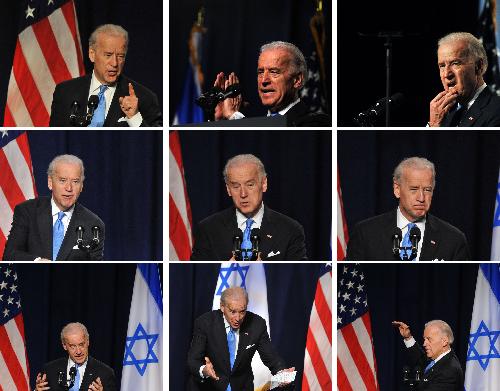Biden wraps up embarrassing visit
Visiting U.S. Vice President Joe Biden concluded his not-so-smooth tour to Israel and the Palestinians on Thursday, leaving behind a newly renewed but already tumbling U.S.-mediated peace process between his two hosts.
 |
|
Combo photo shows U.S. Vice President Joe Biden delivering a speech at Tel Aviv University in Israel, March 11, 2010. Biden on Thursday criticized Israel's recent decision on construction of 1,600 Jewish housing units in East Jerusalem and urged the Jewish state and the Palestinians to push forward their peace process. [Yin Bogu/Xinhua] |
During his four-day visit, the highest level to the volatile region by a U.S. official since U.S. President Barack Obama took office early last year, Biden reaffirmed U.S. alliance with the Jewish state and commitment to its security, prodded the two Middle East foes to make bold strides toward permanent peace and reiterated U.S. determination to prevent Iran from acquiring nuclear weapons.
Yet his originally jovial stay turned sour when the Israeli Interior Ministry announced on Tuesday night, shortly after his warm and "productive" talks with Israeli leaders, that its Jerusalem planning committee had greenlighted a project to build 1, 600 new homes in a Jewish neighborhood in the disputed East Jerusalem, a dramatic development that irked the international community, infuriated the Palestinians, embarrassed Biden and dealt a bruising blow to the indirect parley on which the two sides had just agreed to embark under U.S. mediation.
U.S.-Israeli bond
Biden set his foot on Israel after a year of sparring between the two allies over the settlement issue, a major obstacle blocking the way of the two Middle East neighbors back to the negotiation table.
Bilateral ties were obviously strained when Israel resisted the Obama administration's call for a complete freeze of Jewish construction in the West Bank and East Jerusalem, both of which the Palestinians claim as territories of their future state in addition to the Gaza Strip.
The United States raised the demand with the purpose of cutting a pathway through the Israeli-Palestinian peace impasse that had existed since Israel launched a devastating military campaign against Gaza in late 2008. Yet Israeli Prime Minister Benjamin Netanyahu, sworn in two month after Obama, insisted that natural growth must be allowed in order to accommodate the normal life of the some 300,000 settlers in the West Bank and that Israel has full sovereignty over the whole holy city.
Adding oil to the flame, U.S. Secretary of State Hillary Clinton rejected an Israeli claim that the previous U.S. administration, under President George W. Bush, who was considered to be biased in favor of Israel, had arrived at understandings with the Jewish state that Israel could retain certain settlement blocs in any peace deal with the Palestinians.
Gaps also gaped on the Iranian front, with the U.S. administration adopting a policy of engagement and the Netanyahu government advocating much harsher measures. To the unease of the United States, Israel has repeatedly stressed that it would not rule out the option of launching military strikes against Iran's nuclear facilities.
Against such a subtle backdrop, Biden visited the Middle East ally in an obvious bid to soothe the tensions, highlighting the close relationship between the United States and the Jewish state with remarks as sweet as that the United States has "no better friend" than Israel.
"This is no space between the United States and Israel when it comes to security," the veep said on Thursday in a public address delivered at Tel Aviv University, adding that his country will stand "resolutely beside Israel against the scourge of terrorism."
In his talks with Israeli leaders on Tuesday, Biden repeatedly assured his hosts that the Obama administration is committed to Israel's security.
"The cornerstone of the relationship is our absolute and unvarnished commitment to Israel's security," said Biden at a joint press conference with Netanyahu.
 0
0 






